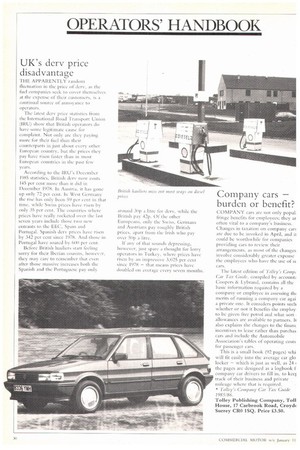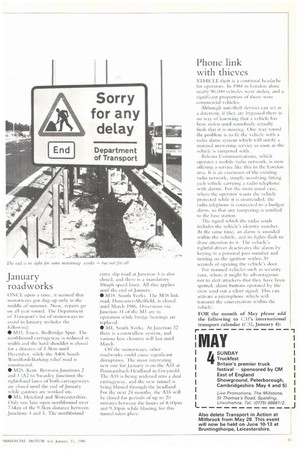OPERATORS' HANDBOOK
Page 30

Page 31

If you've noticed an error in this article please click here to report it so we can fix it.
UK's dery price disadvantage
THE APPARENTLY random fluctuation in the price of derv, as the fuel companies seek to cover themselves at the expense of their customers, is a continual source of annoyance to operators.
The latest dery price statistics from the International Road Transport Union (I RU) show that British operators do have some legitimate cause for complaint. Not only arc they paying more for their fuel than their counterparts in just about every other European country, but the prices they pay have risen faster than in most European countries in the past few years.
According to the RU's December 1985 statistics, British dery now costs 145 per cent more than it did in
• December 1978. In Austria, it has gone up only 72 per cent. In West Germany the rise has only been 59 per cent in that time, while Swiss prices have risen by only 35 per cent. The countries where prices have really rocketed over the last seven years include those two new entrants to the EEC, Spain ;Ind Portugal. Spanish dery prices have risen by 342 per cent since 1978. And those in Portugal have soared by 600 per cent.
Before British hauliers start feeling sorry for their Iberian cousins, howev::r, they may care to remember that even after those massive increases both the Spanish and the Portuguese pay only around 30p a litre for derv, while the British pay 42p. Of die other Europeans, only the Swiss. Germans and Austrians pay roughly British prices, apart from the Irish who pay over 5143 a litre.
If any of that sounds depressing, however, just spare a thought for lorry operators in Turkey, where prices have risen by an impressive 3,025 per cent since 1978 — that means prices have doubled on average every seven months.
Company cars — burden or benefit?
COMPANY cars are nor only popul. fringe benefits for employees; they ar often vital to a company's business. Changes in taxation on company cars are due to be invoked in April, and could be worthwhile for companies providing cars to review their arrangements. as most of the changes involve considerably greater expense the employees who have the use of st cars.
The latest edition of Tolley's Comp. Car Tax Guide, compiled by account] Coopers & Lybrand, contains all the basic information required by a company or employee in assessing thc merits of running a company car agai a private one. It considers points such whether or not it benefits the employ, to be given free petrol and what sort allowances are available to partners. It also explains die changes to the finam incentives to lease rather than purchas cars and include the Automobile Association's tables of operating costs for passenger cars.
This is a small book (92 pages) whi will tit easily into the average car glo locker — which is just as well, as 24 ( the pages are designed as a logbook f company car drivers to fill in, to keel track of their business and private mileage where that is required. * Tolley's Company Car Tax Guide 1985/86.
Tolley Publishing Company, Toll House, 17 Carbrook Road, Croydo Surrey CRO 1SQ. Price 0.50.
January roadworks
or\ich upon a time, it seemed that motorways got dug up only in the middle of summer. Now, repairs go On all year round. Th e nepartment of Transport's list or motorways to av(51(1 in January includes the fidlowing: • Ml I, Essex, Redbridge Spur. Ihe northbound carriageway is reduced in width and the hard shoulder is closed for a distance of 1.5km until December, while the A406 South Woodford-Barking relief road is constructed.
• M25, Kent. Between Junctions 2 and 3 (A2 to Swanky Junction) the right-hand lanes of both carriageways are closed until the end of January while gantries are worked on_ • MS, Hereford and Worcestershire. Only one lane open northbound over 7.6km of the 9.5km distance between Junctions 4 and 5. The northbound entry slip road at Junction 5 is also closed, itid there is ;I 111i0Klatory 511inpli speed limit. All this applies until the end oitinuary.
• M18. South Yorks. The MISlink road, Doncaster-Sheffield, is closed until March 1986. 1)i versions via Junction 31 of the Ml are in operation while bridge bearings are replaced.
• Ml, South Yorks. At Junction 32 there is a (mint-allow system, and various lane closures will last until March.
Off the motorways, other roadworks could (.7:111tie significant disruptions. The most interesting new one for January is on the A55 at Pentnaenbach I leadland in Gwynedd. The A55 is being widened into a dual carriageway, and the new tunnel is being blasted through the headland. For the next 24 months. the A55 will he closed for periods of up to 20 minutes between the hours of 8.00pm and 9.30pm while blasting tbr this tunnel takes place.
Phone link with thieves
VEHICLE theft is a continual headache for operators. In 1984 in London alone nearly 90,000 vehicles were stolen, and a significant proportion of those were corn mercial vehicles.
Although anti-theft devices can act as a deterrent, if they are bypassed there is no way of knowing that a vehicle has been stolen until somebody actually finds that it is missing. One way round the problem is to fit the vehicle with a radio alarm system which will notify a manned answering service as soon as the vehicle is tampered with.
Relcom Communications, which operates a mobile radio network, is now offering a service like this in the London area. It is an extension of the existing radio network, simply involving fitting each vehicle carrying a radio telephone with alarms. For the most usual case, where the operator wants the vehicle protected while it is unattended. the radio telephone is connected to a burlgar alarm, so that any tampering is notified to the base station.
The signal which the radio sends includes the vehicle's identity number. At the same time, an alarm is sounded within the vehicle, and its lights flash to draw attention to it. The vehicle's rightful driver deactivates the alarm by keying in a personal pass number and turning on the ignition within 30 seconds of opening the vehicle's door.
For manned vehicles such as security vans, where it might he :idvantageous not to alert attackers that they have been spotted, alarm buttons operated by the crew send out a silent signal. Ibis can activate a microphone which will transmit the conversation within the vehicle.
FOR the month of May please add the following to CM's international transport calendar (CM, January 4):






















































